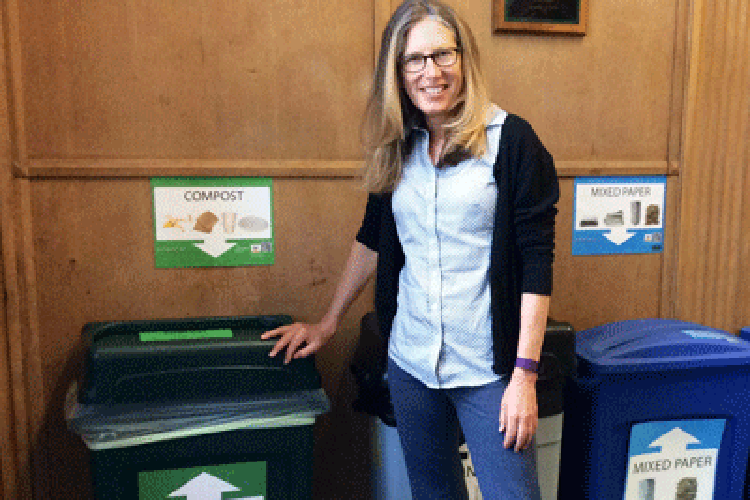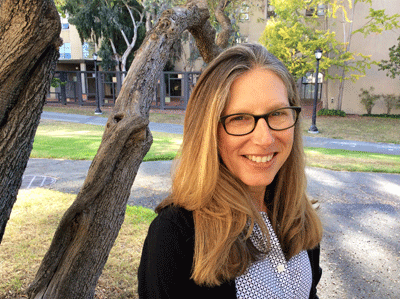To the rescue: Berkeley names Faculty Climate Action Champion
Whendee Silver has been named Berkeley's first Faculty Climate Action Champion as part of UC President Janet Napolitano's 2025 Carbon Neutrality Initiative.

September 29, 2015

Whendee Silver, professor of environmental science, policy and management. (UC Berkeley photos by Kira Stoll)
Whendee Silver might not think of herself as an action hero, but the professor of environmental science, policy and management today was named UC Berkeley’s first Faculty Climate Action Champion.
The honor, for outstanding teaching, research and public service in the areas of climate change solutions, action and broad engagement, is part of a new pilot program that supports UC President Janet Napolitano’s UC 2025 Carbon Neutrality Initiative.
One faculty member per campus will receive the award, which is designed to help meet and focus student demand for climate-action education and to inspire other faculty members to help achieve carbon neutrality through engaged research and education. Each campus has its own timeline for announcing a winner.
In an effort to increase the amount of atmospheric carbon dioxide absorbed by ecosystems, Silver devises and tests viable approaches to slowing climate change with a focus on soils. Soils are the second-largest pool of carbon on Earth’s surface – they store three times more carbon than does the atmosphere or vegetation. But overgrazing and crop cultivation have led to widespread soil carbon losses.
Silver’s group is working to reverse this trend and to lower greenhouse gas emissions in the process. For example, Silver is a founding member and lead scientist for the Marin Carbon Project, which showed that composted organic material – food waste, agricultural waste and green waste – as an amendment to grasslands enhances carbon uptake and storage in soils and plants while also lowering greenhouse gas emissions.
“It is critical that we translate science into action,” says Silver. One way Silver has accomplished this is by helping to build a carbon mitigation partnership, bringing together a wide variety of people including landowners, nonprofit organizations and government agencies. “I have also met repeatedly with the media, and with policy makers in Sacramento and Washington, D.C., to help make our science more accessible. Students, of course, have been a fundamental component of all aspects of this work.”
Silver says she is proud of collaborating with several nonprofit groups to incorporate her science into a carbon-offset protocol. That protocol recently was approved at a national level for carbon credits, which she says will be “important incentives for landowners to adopt this practice.”
A year and a roadmap

Silver will use her award to engage the broader campus, UC system colleagues and local community in her work.
Keith Gilless, dean of the College of Natural Resources and Berkeley’s sponsor for the UC Faculty Climate Action Champion Program, says the Berkeley selection committee was impressed with Silver’s “climate solution work in the urban and agricultural sectors and its focus on increasing carbon capture and storage in soils and vegetation. She has an excellent body of work and exciting next steps planned to engage the broader community. “
The UC award comes with $25,000 to develop, improve, transform and expand each winner’s teaching and research work in an interdisciplinary manner over the course of a year. Silver’s tenure as champion will be from October 2015 through December 2016, and the funding must be spent during that period. An additional $5,000 will be available to fund associated events and community outreach.
Silver says she’ll use her award to engage with the broader campus, colleagues at other UC campuses and the local community on issues including the social and policy hurdles to implementing land-based climate change mitigation projects, and she hopes to engage the city of Berkeley in a “garbage to grasslands” project that would capture organic waste and identify options for land application. She adds that she’ll also teach an open graduate seminar for students, postdoctoral students and faculty that will approach climate change solutions from a multidisciplinary perspective and be entrepreneurial in character, “where ideas can be freely exchanged and collaborations established.”
“The complexity and sheer magnitude of climate change can leave people feeling helpless, and scientists are not immune to this,” says Silver. “It derives in large part from focusing on the severity of environmental problems without offering viable and actionable solutions.
“I hope to change that trend in my teaching and outreach activities by providing a modicum of hope and a roadmap for critically exploring and changing behavior. I hope to motivate others to explore ways in which they can contribute to climate change mitigation.”
The funding Silver will receive from the Faculty Climate Action Champion Program is a one-time amount from the UC Office of the President. During the pilot phase, Berkeley will evaluate whether to continue the program beyond the first year.